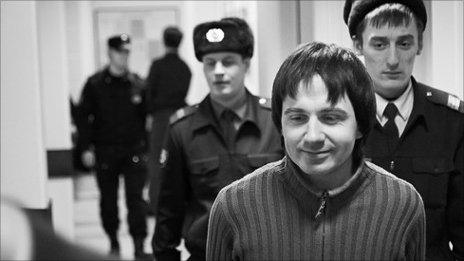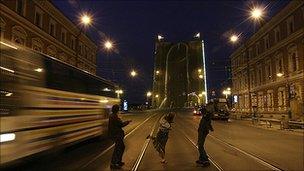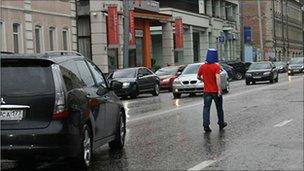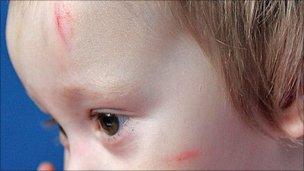How Banksy bailed out Russian graffiti artists Voina
- Published

One of the members of the radical art collective Voina, Leonid Nikolayev
British graffiti artist Banksy may never have been seen in public but his nearest Russian equivalents cannot seem to keep out of the news these days - thanks partly to the Russian police.
Leonid Nikolayev and Oleg Vorotnikov, members of the radical art collective Voina, were freed from custody last week after nearly four months awaiting trial for overturning police cars in St Petersburg.
They held a press conference on Thursday to talk about their ordeal. On their way home, accompanied by Oleg's wife Natalia Sokol and his two-year-old son, Casper, they noticed they were being followed by seven men, who looked like "typical thugs".
When Natalia started taking pictures of the men, they tried to grab the camera. In the struggle she was pushed into a puddle and dragged by the hair, so violently that one of her braids was ripped out.
"They said they were from the Criminal Investigation department," she said when I eventually reached her by e-mail. "But if they really were police investigators they behaved pretty strangely."
Oleg added: "They waved their IDs, but we couldn't examine them. Then they attacked Leonid from behind and rained down blows on my back and my head."
The baby pram was given a violent push, knocking Casper's face hard against a wall.
St Petersburg police could not be reached for comment but a spokesman told the Russian news agency RIA Novosti that "preliminary investigations" were under way.
Full frontal
The news conference was the artists' first public appearance since they walked free from jail - thanks to Banksy paying 300,000 roubles (£6,500) bail for each of them.

The St Petersburg drawbridge faces the security service headquarters
At the time of their release I received breezy e-mail from Leonid. "We're in excellent spirits," he wrote. "Prison has been a most interesting and revealing adventure."
That is not the way most people would describe being locked in a filthy, bug-infested cell for three months.
But then most people wouldn't try crossing one of Moscow's busiest roads with a blue bucket over their head. Leonid, also known as Crazy Lenya, pulled off that stunt earlier this year to protest against the widespread abuse of blue emergency lights by bureaucrats and businessmen.
The name of the collective, Voina, means war, and its artists delight in full frontal confrontation.
Their defining moment came last summer when they painted a giant penis on a St Petersburg drawbridge facing the local headquarters of the Federal Security Service, successor to the KGB.
But it was the overturned police cars that proved the last straw for the authorities and landed Lenya and Oleg Vorotnikov behind bars.
I met the artists in Moscow a couple months after this exploit, and asked Lenya if he wasn't afraid of being attacked or arrested. "Our society has lived in fear for so many decades, we are trying to wake it by kicking it," he replied.
Two weeks later, though, it was the police who did the kicking.
At dawn on 15 November, 10 plainclothes policemen broke into the apartment where the group was staying.
"The cops laid Oleg and Lenya face down, tied their hands behind their backs and put plastic bags on their heads," Natalia explained later.
"They told us they were armed and had the right to use their weapons. Then they flung the guys on to the metal floor of a van and drove to St Petersburg."
Bedbugs and fascists
The artists were accused of aggravated hooliganism, a charge that applies in cases of "incitement of hatred against an ethnic, religious or social group" and carries a maximum five-year prison sentence.

Leonid Nikolayev wore a blue bucket to protest against police misuse of emergency lights
It is typically used to protect gays, foreigners and other minorities - the "social group" in this case is the Russian police.
Natalia posted the letters Oleg wrote her from St Petersburg's infamous Kresty prison on the art collective's website. He said there were "bedbugs everywhere" in the eight-square-metre cell he shared with five other people.
As a newcomer, Oleg had to sleep on the top bunk which inmates call the "palm tree" because it is uncomfortably close to a bare light bulb that shines day and night and is never switched off.
Among the inmates he met were fascists who had decapitated their disloyal comrade and kept his head in the fridge.
"Diseases are rampant", he added. "In almost every cell there is at least one person with HIV or hepatitis. It's against prison rules to keep sick inmates among the general population, but they do it anyway."
It was when Banksy heard my report on Radio 4's From Our Own Correspondent programme, and discovered that the artists had been locked up, that he offered to pay to get them out - but the court initially rejected their bail application.
Psychiatric tests
I met Natalia with her little boy Casper in Moscow in late January. She told me she was very grateful for Banksy's support. For Voina, she said, the British artist was an "inspirational figure" and they admired his "mystique and unpredictable sense of humour".

Casper suffered bruises this week when attackers pushed his pram into a wall
Last week Leonid's lawyer, Pavel Chikov, filed a case with a the European Court of Human Rights in Strasbourg, claiming that the Russian authorities had neither cited sufficient evidence against the artists nor justified holding them indefinitely in pre-trial detention.
The following day (24 February) the Russian judge finally accepted the British artist's bail money.
Oleg and Lenya emerged triumphant and boasted that they had recruited some more Voina members inside the pre-trial jail. But the charges against them still stand.
In fact, there is a risk that they may be re-incarcerated and subjected to psychiatric tests, which lawyers say the investigator in charge of the case has asked for.
"This looks like the return of punitive psychiatry," said Igor Ryabchikov, Oleg's lawyer, referring to the Soviet-era tactic of forcibly sectioning dissidents.
The lawyer also intends to fight his client's tough bail terms - which include an obligation to give the authorities two hours' notice every time he wants to leave the house. If he is ever deemed to have broken the conditions, he will be rearrested and Banksy's money will be forfeited.
Ironically, Voina's penis-on-the-bridge stunt titled A Dick Captured by the FSB was recently nominated for a state prize for contemporary art - only to be mysteriously removed from the shortlist a week ago.
Leonid's response was terse: "They can do what they like with the penis - we don't have copyright."
Natalia added: "Voina never has and never will participate in any awards or money prizes. Our art touches people. And no-one dares fix a price to it."
- Published13 December 2010